10 Classic Creole Food Recipes You Need to Taste

Ever dream of the scents and flavors that take you to New Orleans? I do! Walking into a Creole restaurant, I was hooked by the tastes. Creole food is more than food—it’s a celebration, a story, and a mix of cultures in one bite.
Picture a table full of dishes like Gumbo, Jambalaya, and Étouffée. Each dish invites you to taste the traditions and history. These recipes blend African, French, Spanish, and Native American flavors, making something special. Ready for a culinary adventure? Start with these top ten classic Creole dishes. Let’s make your kitchen more exciting!
Key Takeaways
- Creole cuisine is a mix of African, French, Spanish, and Native American flavors.
- Authentic Creole recipes offer a rich, flavorful dining experience that takes you to New Orleans.
- Classic dishes like Gumbo, Jambalaya, and Étouffée are key to Creole cooking.
- Each traditional Creole dish has its own story, told through unique spices and hearty ingredients.
- Exploring Creole cuisine can make your home cooking more exciting and diverse.
What is Creole Cuisine?
Creole cuisine is a mix of cultures and cooking styles from Louisiana. It’s why people love the best creole meals. Every bite is a taste of history! Let’s explore the past and key ingredients that make Creole cooking so special.
The History of Creole Food
Creole food started in the colonial era. It was shaped by French, Spanish, African, and Native American cooking. This mix came from New Orleans and spread across the country.
The city’s mix of cultures led to bold and complex flavors. This is what makes Creole food so unique.
Key Ingredients in Creole Cooking
Creole cooking is known for its essential ingredients. The “holy trinity” of onion, bell peppers, and celery is at the heart of many dishes. Seafood, like shrimp, is also key, making Creole seafood dishes very popular.
Andouille sausage, okra, and spices add a special kick. These ingredients make every dish, from gumbo to jambalaya, unforgettable.
Gumbo: A Signature Dish
Gumbo is a beloved Creole staple. It shows the rich cultural mix of this cuisine. This dish brings together unique flavors and ingredients.
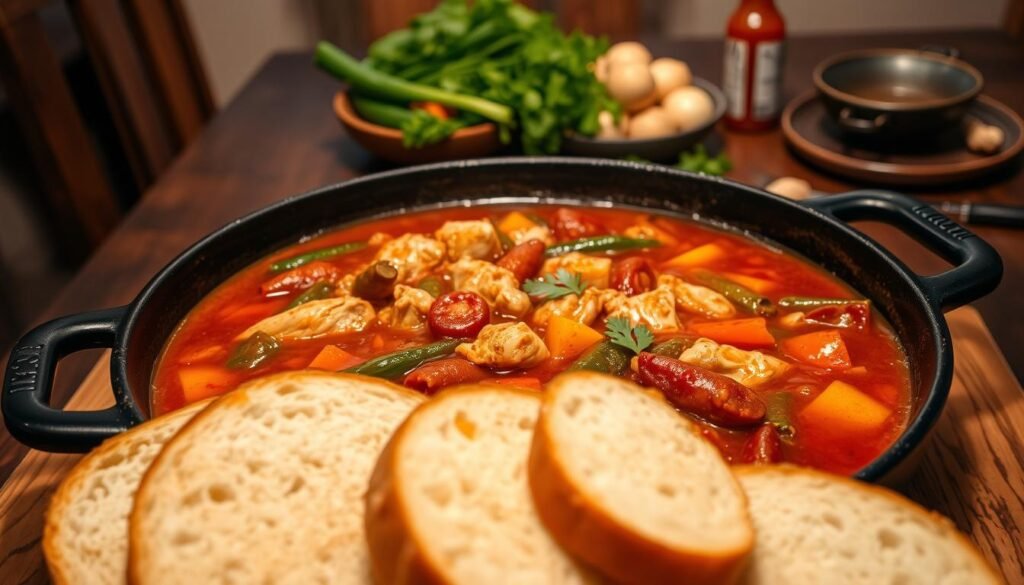
Origins of Gumbo
Gumbo comes from New Orleans’ diverse community. It’s a dish with deep roots. It reflects French, Spanish, African, and Native American cooking styles.
Essential Ingredients
The key to gumbo’s flavor is its ingredients. A roux-based broth is the base. Seafood or meats and the “holy trinity” of onions, bell peppers, and celery are added.
Okra and spices also add to the taste. This makes gumbo one of the most irresistible easy creole recipes.
Cooking Techniques for Perfect Gumbo
Perfecting gumbo takes a few key techniques. Making the roux needs patience. It must be slowly browned for the right flavor.
Choosing the best spices is important. Letting the ingredients simmer gently makes every bite rich. Remember, cooking gumbo is about technique and ingredients!
Jambalaya: One-Pot Wonder
Jambalaya is a one-pot dish that mixes rice, meats, veggies, and spices. It’s a key dish in Creole cooking, full of flavor in every bite! Are you curious about the old and new ways of making Jambalaya? Let’s explore.
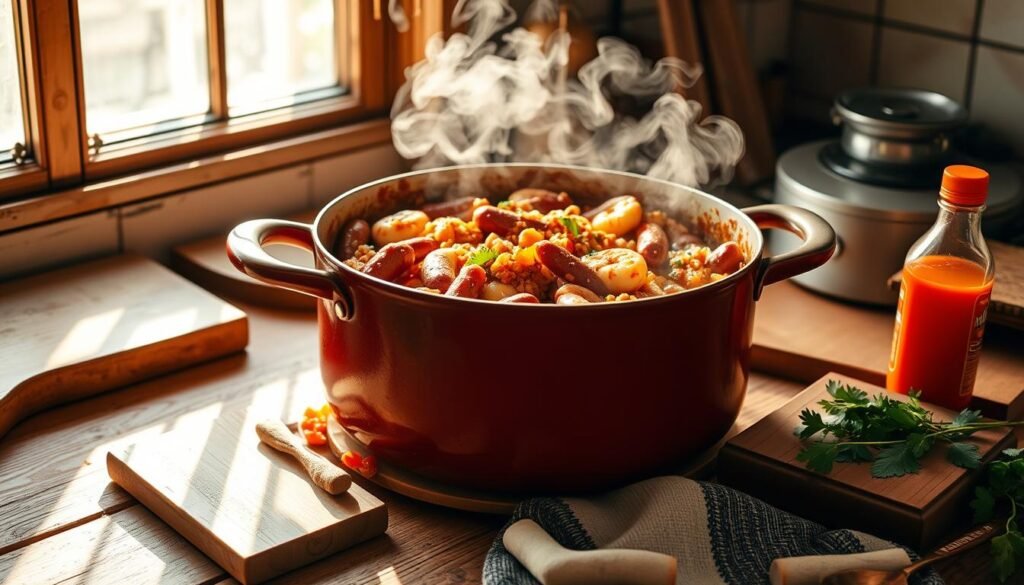
Traditional vs. Modern Jambalaya
The old Jambalaya has chicken, sausage, and shrimp, all seasoned well. It’s brown from the meat. The new Creole Jambalaya has tomatoes, making it red. Both are rich, thanks to slow cooking that mixes flavors perfectly—are you ready to try these easy creole recipes?
Variations of Jambalaya
Jambalaya can be many things, from seafood to veggie versions. It’s all about what you like. Want quick creole recipes? Swap meats or veggies to your liking. Jambalaya is full of ideas to excite your taste buds!
Tips for the Best Flavor
For the best Jambalaya, use quality smoked sausage like Andouille. Don’t hold back on spices like cayenne, thyme, and paprika. Slow cooking is key to let all flavors come together. Follow these tips for a dish that’s truly delightful.
| Ingredient | Traditional Jambalaya | Modern Jambalaya |
|---|---|---|
| Rice | White Rice | Long Grain Rice |
| Meats | Chicken, Sausage, Shrimp | Chicken, Sausage, Shrimp, Additional Seafood |
| Vegetables | Bell Peppers, Celery, Onion | Bell Peppers, Celery, Onion, Tomatoes |
| Seasonings | Thyme, Paprika, Cayenne | Thyme, Paprika, Cayenne, Bay Leaves |
Étouffée: A Rich Experience
Étouffée is a rich and hearty creole food. It takes you on a journey through Louisiana’s vibrant flavors. Its thick, luxurious texture makes it stand out among creole meals.
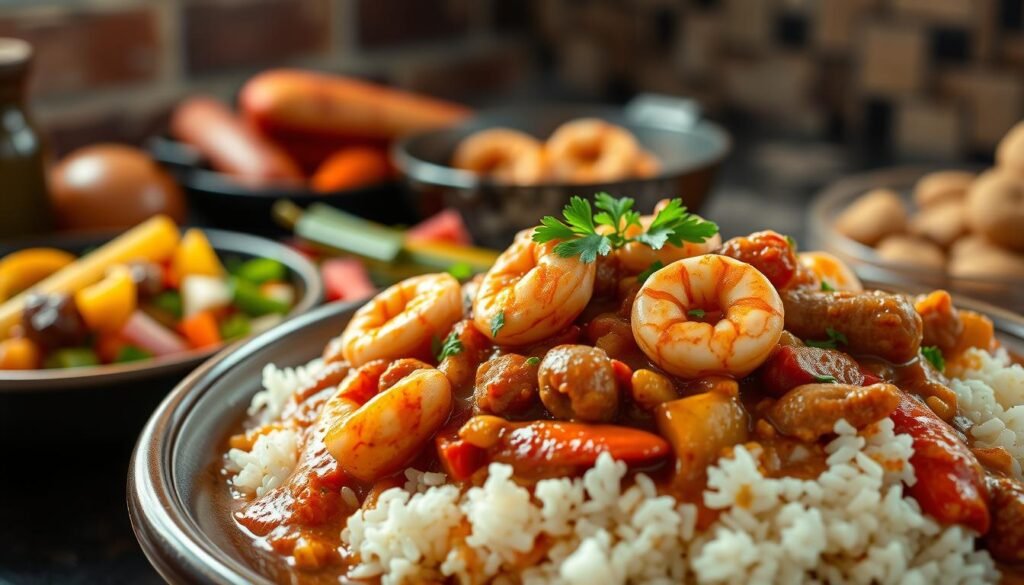
Differences Between Étouffée and Gumbo
Étouffée and gumbo are both creole favorites. But gumbo is a thinner stew with many ingredients. Étouffée, on the other hand, focuses on one meat, like crawfish or shrimp. It has a thicker, sauce-like consistency.
Essential Ingredients for Étouffée
To make authentic étouffée, start with key ingredients. You’ll need a strong shellfish stock and the ‘Holy Trinity’ (green bell peppers, onions, and celery). Add a mix of spices for flavor. Fresh crawfish or shrimp are the stars of this dish.
Serving Suggestions
How to serve étouffée is important. Traditionally, it’s served over fluffy white rice. This lets you enjoy the thick sauce. Pair it with a crisp salad or crusty French bread for a complete meal.
Crawfish Bisque: A Southern Delight
Crawfish Bisque is a creole seafood treat that will wow your taste buds! It’s a creamy soup with deep flavors. Each spoonful takes you on a journey through the best of creole meals.
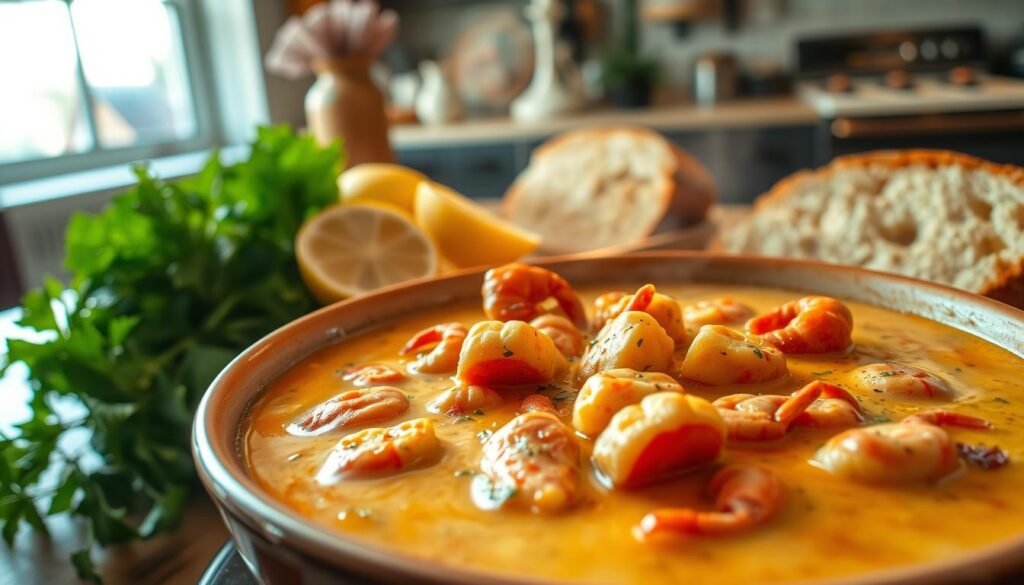
Choosing the Right Crawfish
Choosing the right crawfish is crucial for a great Bisque. Freshness is key. Always pick live crawfish if you can. They should be lively and vibrant!
If frozen crawfish are your only option, choose from trusted suppliers. Fresh crawfish make the bisque taste better.
Cooking Methods for a Creamy Bisque
The secret to a perfect Bisque is in the cooking. Start by simmering the crawfish to get their sweet flavors. Make a rich roux as the base for a velvety texture.
Slowly add the crawfish stock while stirring to avoid lumps. Let it simmer slowly. Adding heavy cream at the end makes it even better!
Red Beans and Rice: Comfort Food
Red beans and rice is a top pick for simple Creole dinners. It’s a favorite in New Orleans, showing true Creole comfort. This dish was made on Mondays, when laundry day needed a meal that could simmer all day.
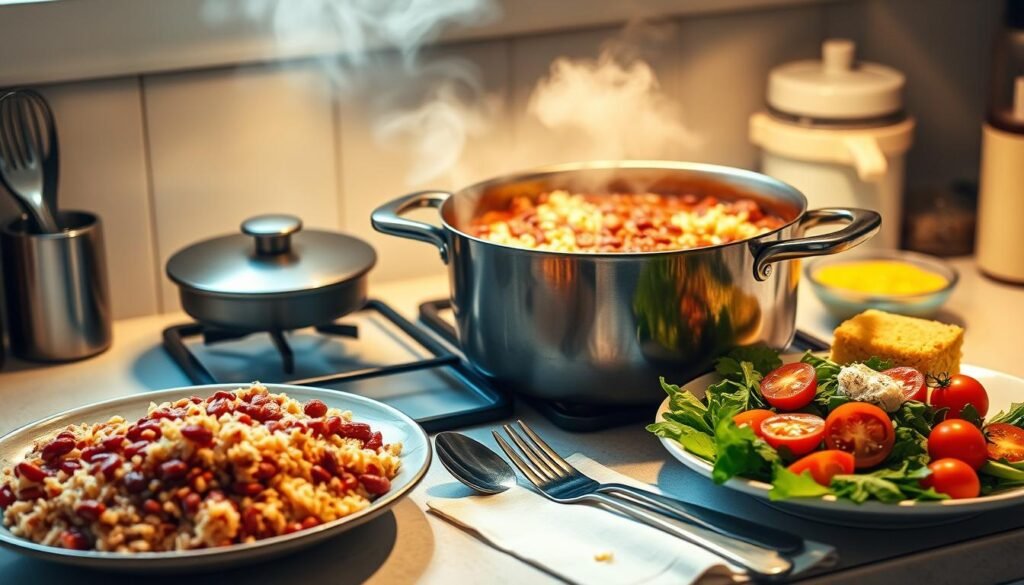
How to Make Perfect Red Beans
Making creamy red beans takes patience, but it’s worth it. Start by soaking 1 pound of dried red beans overnight. In the morning, drain and cover the beans with fresh water. Add 1/2 pound of diced lean salt pork, bacon, or ham.
Bring the mixture to a low boil, then reduce the heat. Cover and let it simmer for about 15 minutes.
Next, sauté 1 cup of chopped onion and 1 minced garlic clove in a tablespoon of olive oil until golden. Add this to your beans along with 2 tablespoons of chopped fresh parsley, 3/4 teaspoon of salt, and 2 teaspoons of TABASCO® Original Red Sauce. Cover and continue to simmer for 1.5 to 1.75 hours, ensuring the beans remain covered with water. Stir occasionally and add hot water as needed. Serve this delightful mixture over hot cooked rice, and voilà—you have an easy creole food idea that’s sure to please!
The Tradition of Monday Red Beans
Red beans and rice became a celebrated dish on Mondays in New Orleans. It started as a practical meal for wash day. The beans could cook all day, allowing home cooks to focus on laundry.
This tradition is so ingrained in New Orleans culture that Governor John Bel Edwards declared October 24, 2022, as Red Beans and Rice Day!
As a traditional creole breakfast or dinner, red beans and rice have become a cherished meal. It’s deeply rooted in history but simple and adaptable. So next time you’re pondering simple creole dinner ideas or even an easy creole food idea for breakfast, remember the comforting, flavorful promise of red beans and rice.
| Ingredients | Instructions |
|---|---|
| 1 lb dried red beans 1/2 lb diced lean salt pork, bacon, or ham 1 cup chopped onion 1 minced garlic clove 1 tbsp olive oil 2 tbsp chopped fresh parsley 3/4 tsp salt 2 tsp TABASCO® Original Red Sauce Hot cooked rice |
1. Soak beans overnight. 2. Drain and cover beans with fresh water. 3. Add pork, bacon, or ham and bring to a low boil. 4. Reduce heat, cover, and simmer for 15 minutes. 5. Sauté onion and garlic in olive oil until golden. 6. Add onion mixture, parsley, salt, and TABASCO® to beans. 7. Cover and simmer for 1.5 to 1.75 hours, adding water as needed. 8. Serve over hot cooked rice. |
Shrimp Creole: A Seafood Classic
Shrimp Creole is a seafood dish full of vibrant flavors! It’s made with juicy shrimp in a tomato-based sauce. This dish is great for both seasoned chefs and beginners. It’s a standout healthy Creole meal that’s easy to make.

Cooking Shrimp to Perfection
Cooking shrimp right is key to a great Shrimp Creole. Overcooked shrimp can be tough and lose their flavor. Start with fresh, deveined shrimp and cook them until they’re pink.
This usually takes 3-4 minutes per side in a hot skillet. The shrimp will keep cooking a bit after they’re out of the heat. So, watch them closely to avoid overcooking. This way, your Shrimp Creole will be tender and delicious!
Pairing Shrimp Creole with Sides
Choosing the right sides can make your Shrimp Creole even better. Traditional white rice is a great choice because it absorbs the sauce well. But, you can also try cornbread for a sweet contrast.
Both options are great and make the dish memorable. Shrimp Creole is a flavorful dish that’s easy to make. It’s a must-try for anyone wanting to enjoy healthy Creole meals!
Beignets: Sweet Creole Treats
Starting the day with a traditional creole breakfast is special. Beignets are a key part of New Orleans. They are sweet, fluffy pastries covered in powdered sugar. You can enjoy them hot at Café du Monde or at home.

The Best Beignet Recipe
To make the best beignets, you need flour, yeast, milk, eggs, vanilla, and powdered sugar. First, warm the milk and add yeast. This makes the dough fluffy.
Then, mix in the other ingredients. Let the dough rise until it’s double in size. Roll it out, cut into shapes, and fry until golden.
Tips for Serving Beignets
Serving beignets is all about timing. They’re best when fresh and hot. Enjoy them with café au lait for a classic delicious creole meal.
Or, pair them with milk or hot chocolate for a simple creole snack. Remember, lots of powdered sugar is key!
Po’boys: A Delicious Sandwich
Hey there! Ever tried a Po’boy? Let’s explore the tasty world of New Orleans with this legendary sandwich. Po’boys are more than a sandwich. They’re a key part of Creole cuisine and culture, great for simple creole dinner ideas!
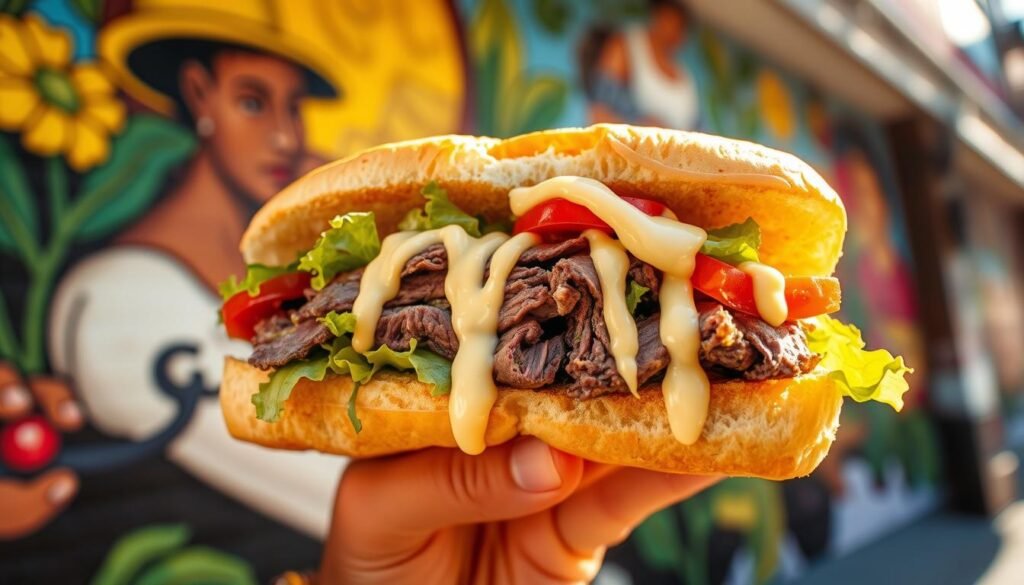
Origin and Evolution of Po’boys
The Po’boy story began in the late 1920s during a streetcar strike. Benny and Clovis Martin, former conductors, gave free sandwiches to striking workers. These sandwiches, filled with affordable, tasty ingredients, became a hit. They started as simple meat sandwiches but now have many fillings, making them a top creole rice dish!
Popular Po’boy Fillings
Today, Po’boys offer a wide range of flavors. You can find roast beef smothered in gravy or crispy fried shrimp. Other favorites include fried oysters, hot sausage, and catfish! These fillings, on the iconic French bread, make Po’boys a beloved choice. They’re not just sandwiches; they’re a full meal! Perfect for creole side dishes or as the main dish, a Po’boy is always a great pick.
The Influence of Creole Food Today
Creole food has spread far from New Orleans, leaving a big mark on American food. It mixes French, Spanish, African, and Native American tastes. This mix of flavors is loved by food lovers everywhere.
You might see Creole chicken recipes on trendy menus or in home cooking. It shows how Creole food is still loved today, even in fast times.
Creole Food in Modern Cuisine
Today, chefs and food fans are trying new things with Creole recipes. They mix old ways with new ideas. This makes Creole food exciting and fresh.
From food trucks to fancy restaurants, Creole dishes are everywhere. People love the old ways but also want to try new things. This mix keeps Creole food alive and introduces it to more people.
The Future of Creole Cooking in America
What’s next for Creole cooking in America? With more interest in local foods and comfort dishes, it looks good. Creole food is a mix of history and new ideas.
More chefs and home cooks will explore traditional Creole dishes and create new ones. Creole food will keep growing, bringing joy to future generations with its special flavors.